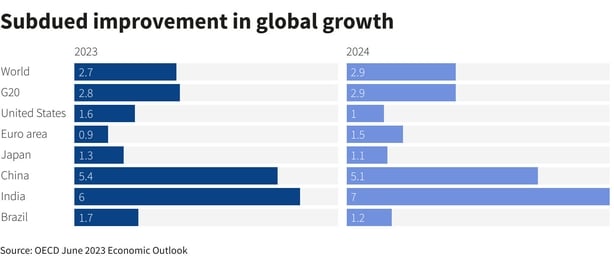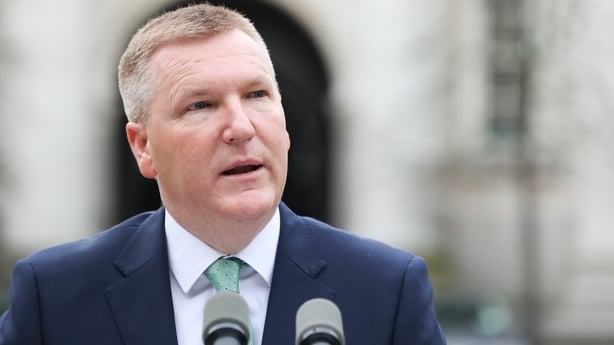Global economic growth will pick up only moderately over the next year as the full effects of central bank rate hikes are felt, softening the boost from lower inflation, the OECD said today, nudging up its 2023 economic outlook.
The world economy is set to grow 2.7% this year, the Organisation for Economic Cooperation and Development (OECD) said.
This was up from its previous forecast of 2.6% in March.
Though boosted by the lifting of China's zero-Covid policy, that would be the lowest annual rate since the 2008-2009 global financial crisis with the exception of the pandemic-hit year of 2020, the Paris-based organisation said.
Growth would then accelerate only slightly next year to 2.9% - unchanged from March's forecast - as the impact of rate hikes by major central banks over the last year increasingly drags on private investment, starting with housing markets.
The World Bank this week also cited the growing impact of rate hikes as it raised its forecast for world growth this year to 2.1% but for 2024 cut it back to 2.4% from a previous 2.7% forecast.
A sharp fall in May for Chinese exports released today also pointed to weakening global demand.

The OECD forecast that inflation in the Group of 20 major economies would fall from 7.8% last year to 6.1% this year and 4.7% in 2024 - still well above many central banks' targets despite the interest rate hikes.
The US Federal Reserve's main interest rate was seen peaking soon at 5.25-5.5%, with "modest" rate cuts in the second half of 2024.
In the euro area, the OECD expects the European Central bank to keep raising rates in the face of still high core inflation, with a peak seen in the third quarter. It forecast the ECB would then leave its main rate at 4.25% until the end of 2024.
The Bank of Japan was expected to keep monetary policy accommodative, with no increase until the end of 2024, while UK rates were seen peaking some time from the second quarter of 2023.
The OECD forecast the US economy would grow 1.6% this year before slowing to 1% in 2024, with the lagged effect of rate hikes hitting the world's biggest economy particularly hard. It had previously foreseen US growth of 1.5% this year and 0.9% in 2024.
Boosted by the end of Covid restrictions, the Chinese economy was expected to grow 5.4% in 2023 before moderating to 5.1% in 2024. China's growth was previously forecast at 5.3% and 4.9% respectively.
As Europe's winter energy price shock fades, euro area growth was seen accelerating from 0.9% this year to 1.5% in 2024 as lower inflation weighed less on incomes. In March, the OECD saw growth of 0.8% in 2023 and 1.4% in 2024.
Similarly, UK growth was seen rising from 0.3% in 2023 to 1% in 2024 as real income growth starts to improve. The UK's outlook was raised from March forecasts for -0.2% in 2023 and 0.9% in 2024.
Meanwhile, the Minister for Finance Michael McGrath is in Paris for an official visit focused on the OECD Ministerial Council Meeting.

Mr McGrath will join with ministers from around the globe to hold talks on topics such as the global economic outlook, gender equality, Ukraine and cooperation and support for reconstruction and economic resilience through trade policies for resilient, sustainable and inclusive growth.
As well as the formal discussion sessions, Mr McGrath will also have a bilateral meetings with OECD Secretary General Mathias Cormann
"Ireland is very active in the OECD as it carries out its influential work multiple policy areas ranging from economics and tax to development and gender equality," Michael McGrath said.
"I am looking forward to this OECD Ministerial Council Meeting as it will provide an excellent opportunity to meet and take stock of the global economy in terms of recent developments and outlook," he said.
"We will also discuss the OECD's work in support of Ukraine, to which Ireland will be making a meaningful contribution. We will also be sharing perspectives on trade policies which can help to achieve sustainable and inclusive growth and broader economic resilience," he added.

